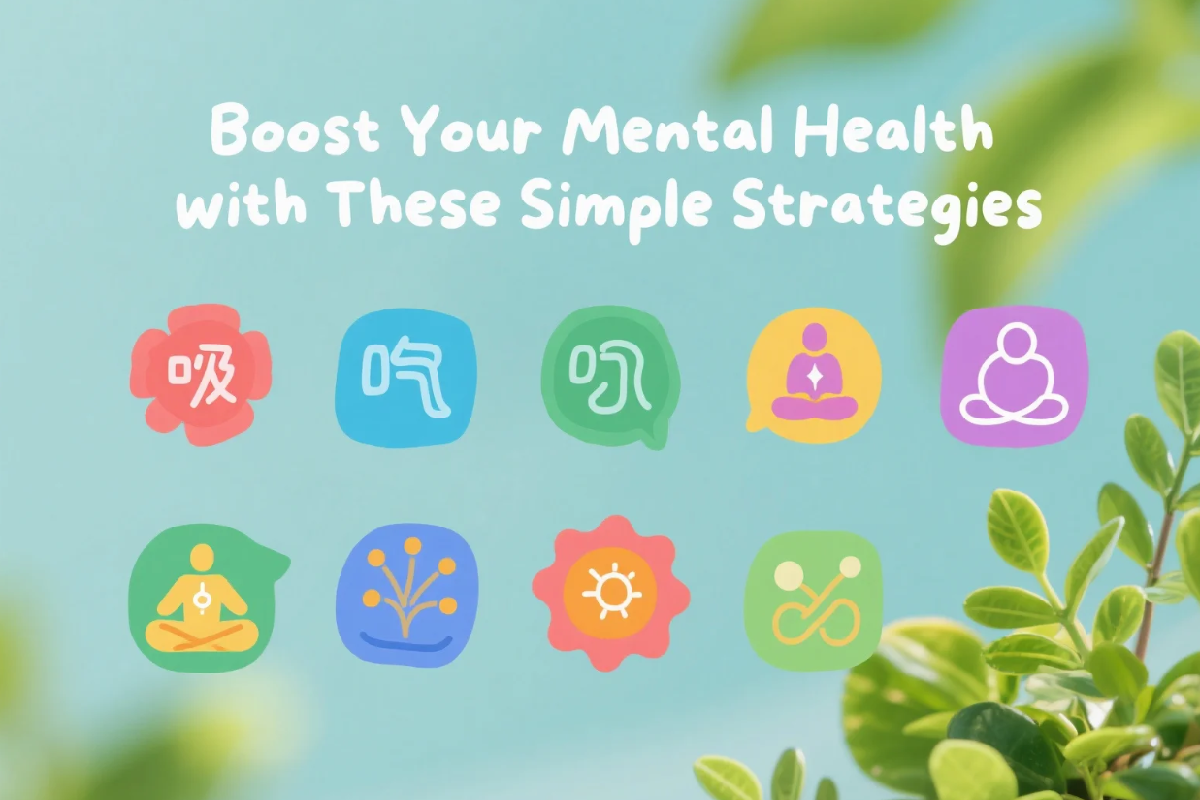Boost Your Mental Health with These Simple Strategies
-
29
- 16 Oct, 2025

Mental health is a key component of overall well-being, yet it is often neglected or overlooked. Whether you’re struggling with stress, anxiety, or just need a little extra help maintaining balance in your life, improving your mental health doesn’t always have to be complex or time-consuming. In fact, there are simple strategies you can implement today to start feeling better mentally and emotionally.
In this article, we’ll explore ten actionable strategies to boost your mental health. These tips are easy to integrate into your daily routine and are designed to help you manage stress, improve mood, and lead a more balanced life. From simple self-care habits to fostering meaningful connections, these mental health tips will empower you to take control of your emotional well-being.
What You Will Learn
- Ways to Boost Mental Health with Daily Habits
- Practical tips for managing stress and anxiety
- The power of mindfulness and self-care in boosting mental well-being
- Simple ways to foster social connections for emotional support
Let’s dive into these mental health strategies that can lead to positive changes in your life.
1. Practice Mindfulness and Meditation
The Power of Present Moment Awareness
Mindfulness is the practice of staying fully engaged in the present moment without judgment. By being mindful, you can reduce negative thinking, improve focus, and lower stress levels. Studies show that regular mindfulness meditation can have a profound impact on mental health, including reducing anxiety and improving emotional regulation.
Here’s how you can practice mindfulness:
- Start small: Dedicate 5-10 minutes each day to practicing mindfulness meditation.
- Focus on your breath: Focus on each inhale and exhale. If your mind starts to drift, softly guide your attention back to your breath.
- Practice throughout the day: Mindfulness isn’t limited to meditation. Practice being fully present while eating, walking, or even doing chores.
Just a few minutes of mindfulness each day can soothe your mind and improve your emotional well-being.
2. Exercise Regularly
Get Moving for Mental Health
Exercise is not just good for your body; it's essential for your mental health too. Exercise prompts the release of endorphins, which are the body’s natural mood enhancers. Regular exercise helps reduce symptoms of depression and anxiety, boosts self-esteem, and promotes better sleep.
Try to get at least 30 minutes of moderate exercise, like walking, cycling, or yoga, on most days of the week. Some great options include:
- Walking or jogging outdoors
- Yoga or stretching routines
- Dancing to your favorite music
- Strength training with light weights
The best part? You don’t need to be a fitness enthusiast to experience the mental health benefits of exercise. A brief daily walk can have a noticeable impact.
3. Get Enough Sleep
Sleep: The Foundation of Mental Health
It looks like you didn’t provide any text to rewrite. Could you share what you'd like to rephrase? Sleep deprivation can lead to mood swings, irritability, increased stress, and difficulty concentrating. Conversely, a restful night’s sleep can boost cognitive function, promote emotional stability, and reduce stress levels.
To improve sleep quality:
- Establish a routine: Keep a consistent bedtime and wake-up time every day, including weekends.
- Create a relaxing bedtime ritual: Wind down with calming activities such as reading, taking a warm bath, or practicing relaxation techniques.
- Limit screen time: Avoid screens at least 30 minutes before bedtime, as the blue light from phones and computers can interfere with sleep.
By prioritizing sleep, you'll feel more energized and better equipped to manage daily challenges.
4. Foster Strong Social Connections
The Power of Relationships on Mental Health
Social connections are vital for mental well-being. Positive social relationships can act as a buffer against stress, depression, and anxiety. Having a support system of friends, family, or even support groups can make it easier to cope with life’s challenges.
To strengthen social connections:
- Reach out to loved ones: Make time for regular phone calls, video chats, or meetups.
- Join a community or group: Whether it’s a fitness class, a hobby group, or a volunteer organization, being part of a community can reduce feelings of isolation.
- Be open and honest: Share your feelings and be attentive to others. Building deep connections requires vulnerability and mutual support.
Remember, you don’t have to face challenges alone. Surround yourself with people who lift you up and offer encouragement.
5. Practice Gratitude Daily
Focus on the Positive
Taking time to reflect on the positive aspects of your life can help shift your focus away from negative thoughts. Gratitude is strongly associated with improved mental health as it fosters optimism, reduces stress, and boosts self-esteem.
Here’s how to practice gratitude:
- Keep a gratitude journal: Each day, jot down three things you're grateful for, no matter how big or small.
- Express gratitude to others: Pause for a moment to show appreciation to someone for their support, kindness, or friendship.
- Visualize your blessings: Close your eyes and mentally list the things that make you feel thankful.
Cultivating gratitude helps train your brain to focus on the positive, which leads to a more positive mindset and emotional resilience.
6. Eat a Balanced Diet
Fuel Your Brain with Nutritious Foods
A balanced diet is key not just for physical health but also for mental well-being. Poor nutrition can negatively impact your mood and cognitive function. On the other hand, eating a diet rich in whole foods, vitamins, and minerals can enhance brain function and reduce stress.
Some foods that are particularly helpful for mental health include:
- Omega-3 fatty acids: Found in fish, walnuts, and flaxseeds, they help improve mood and brain function.
- Leafy greens: Vegetables such as spinach and kale are rich in nutrients that promote brain health.
- Whole grains: Brown rice, oats, and quinoa provide steady energy and support a balanced mood.
By eating well, you can support both your body and mind, helping you feel more balanced and energized.
7. Manage Your Stress Effectively
Stress Management Techniques for a Calmer Mind
Stress is a part of life, but your response to it can make a big difference. Using effective stress management techniques can help lessen its physical and emotional effects on your body and mind.
Here are some strategies to manage stress:
- Deep breathing exercises: Take slow, deep breaths to trigger your body’s natural relaxation response.
- Progressive muscle relaxation: Tense and release each muscle group to reduce physical tension.
- Time management: Break tasks into smaller steps and set realistic goals to avoid feeling overwhelmed.
By managing stress effectively, you can maintain a more positive outlook and protect your mental health.
8. Take Time for Self-Care
Prioritize Yourself for Better Mental Health
Self-care is about taking intentional actions to nurture your physical, emotional, and mental well-being. When you make time for yourself, you reduce stress, increase your sense of fulfillment, and improve your overall mental health.
Some self-care practices include:
- Engage in hobbies: Do something you enjoy, whether it’s painting, reading, or gardening.
- Take breaks: Step away from work or stressful situations to recharge your energy.
- Pamper yourself: Treat yourself to a spa day, enjoy a warm bath, or do something that makes you feel relaxed and cared for.
Self-care is an essential practice for maintaining mental health, and it doesn’t require a lot of time or resources. The key is consistency.
9. Set Healthy Boundaries
Protect Your Mental Health with Boundaries
Setting boundaries is essential for maintaining mental well-being. Whether it’s saying no to extra commitments or limiting time with toxic people, establishing clear boundaries helps protect your emotional health and prevents burnout.
To set healthy boundaries:
- Be assertive: Clearly communicate your limits to others without feeling guilty.
- Learn to say no: You don’t have to accept every invitation or request. Prioritize your needs.
- Take breaks from technology: Set aside time each day to disconnect from social media and emails.
Setting boundaries helps ensure that you prioritize your mental health and well-being, which ultimately leads to greater happiness and productivity.
10. Seek Professional Support When Needed
Don't Be Afraid to Ask for Help
If you’re struggling with mental health challenges such as depression, anxiety, or stress, seeking professional support can make a significant difference. Therapy or counseling offers a supportive environment to explore your emotions, develop coping skills, and navigate life’s challenges.
If you're unsure where to start:
- Reach out to a therapist or counselor: Many professionals offer in-person or virtual therapy sessions.
- Consider support groups: Talking to others who understand what you’re going through can provide comfort and guidance.
- Consult with a doctor: If you’re experiencing symptoms of mental health disorders, a healthcare provider can help determine the right course of action.
There’s no shame in seeking help. In fact, asking for help is a sign of strength and a step toward healing.
Begin Your Journey to Better Mental Health Today
Enhancing your mental health doesn’t have to involve major changes or costly treatments. By incorporating these simple strategies into your daily life, you can start feeling better both physically and emotionally. From practicing mindfulness to setting healthy boundaries, each step you take will help you build a stronger, more resilient mind.
Remember, mental health is a journey, and every small step you take counts. Whether it’s practicing gratitude, getting more sleep, or seeking professional help, prioritize your well-being and make your mental health a top priority today.










